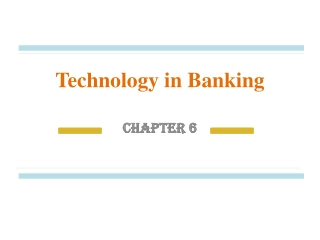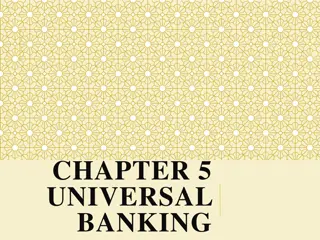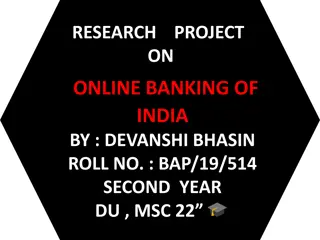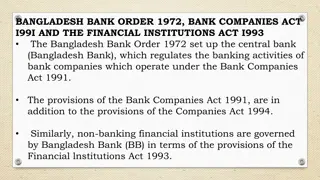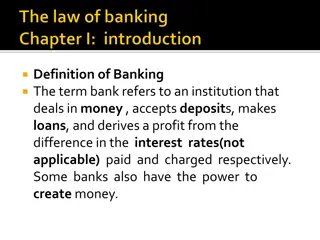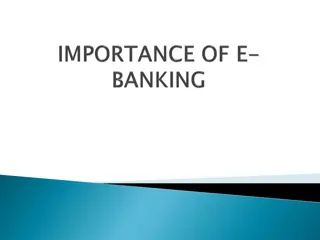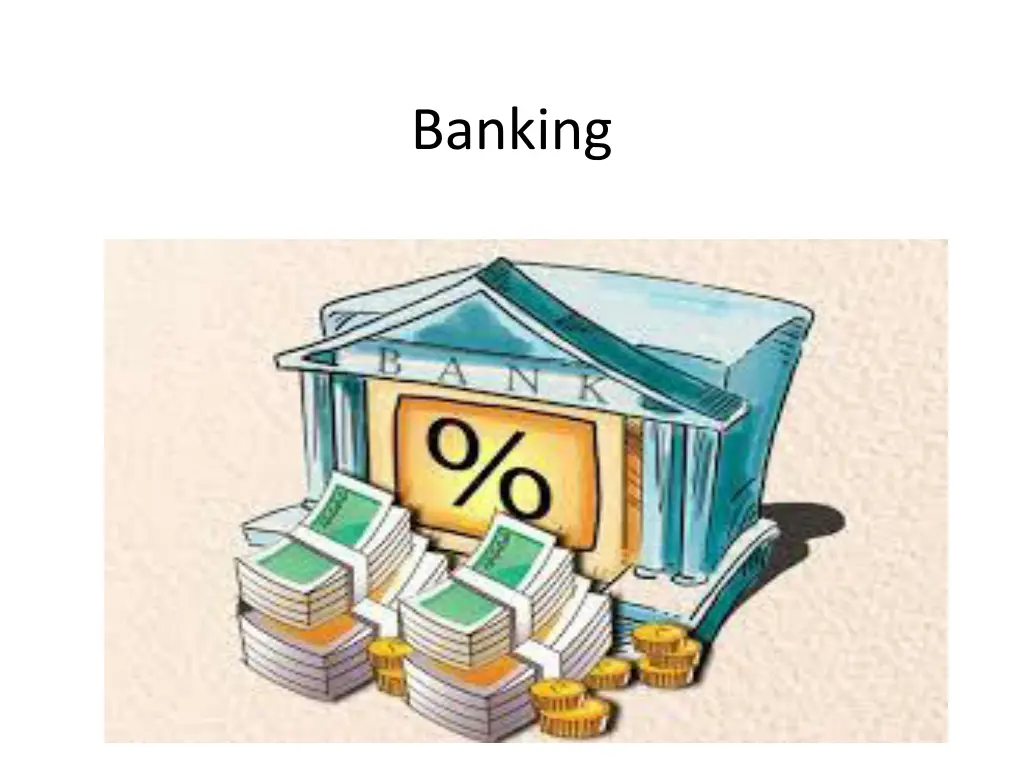
Evolution and Significance of Banking Industry in India
Discover the rich history and evolution of banking in India, from the establishment of early banks like Bank of Hindustan in 1770 to the formation of the State Bank of India in 1955. Learn about the structure of the Indian banking system, the role of the Reserve Bank of India, and the historical background of key banking institutions. Explore the meaning and definition of banking, as well as the functions and importance of banks in managing cash, credit, and financial transactions.
Download Presentation

Please find below an Image/Link to download the presentation.
The content on the website is provided AS IS for your information and personal use only. It may not be sold, licensed, or shared on other websites without obtaining consent from the author. If you encounter any issues during the download, it is possible that the publisher has removed the file from their server.
You are allowed to download the files provided on this website for personal or commercial use, subject to the condition that they are used lawfully. All files are the property of their respective owners.
The content on the website is provided AS IS for your information and personal use only. It may not be sold, licensed, or shared on other websites without obtaining consent from the author.
E N D
Presentation Transcript
Meaning of Banking Banking is an industry that handles cash, credit, and other financial transactions. Banks provide a safe place to store extra cash and credit.
Definition of Banking As per Section 5(b) of the Banking Regulation Act, 1949 , "banking" means the accepting, for the purpose of lending or investment, of deposits of money from the public, repayable on demand or otherwise, and withdrawable by cheque, draft, order or otherwise.
History of Bank Bank of England (Issue of Banknotes) - 1695 Royal Bank of Scotland ( Overdraft) 1728 The word bank was borrowed in Middle English and from Middle French banque , from Old Italian banco , meaning "table", from Old High German banc, bank "bench, counter".
Evolution of Banking in India Bank of Hindustan - 1770 and liquidated in 1829 32 General Bank of India - 1786 but failed in 1791 The largest bank, and the oldest still in existence, is the State Bank of India (S.B.I) Reserve Bank of India was established in 1935, under the Reserve Bank of India Act, 1934.
State Bank of India It was originated and started working as the Bank of Calcutta in mid-June 1806. In 1809, it was renamed as the Bank of Bengal. The other two were the Bank of Bombay in 1840 and the Bank of Madras in 1843. The three banks were merged in 1921 to form the Imperial Bank of India, which upon India's independence, became the State Bank of India in 1955.
Reserve Bank of India Reserve Bank of India (RBI) is India's central banking institution, which controls the monetary policy of the Indian rupee. It commenced its operations on 1 April 1935 in accordance with the Reserve Bank of India Act, 1934. Headquarters Mumbai Present Governor Urjit Patel
Scheduled Commercial Banks Scheduled commercial banks are those banks which are included in the Schedule II of RBI Act, 1934. Scheduled commercial banks carry out the normal business of banking activities such as accepting deposits, giving loans and other banking services.
Non-Scheduled Banks Andaman and Nicobar State Co- operative Bank Ltd. 2 Arunachal State Co-operative Apex Bank Ltd. 3 Assam Co-operative Apex Bank Ltd. 4 Chandigarh State Co-operative Bank Ltd. 5 Delhi State Cooperative Bank Ltd. 6 Jammu and Kashmir State Co-operative Bank Ltd. 7 Jharkhand State Cooperative Bank Ltd. 8 Manipur State Co-operative Bank Ltd. 9 Meghalaya Co-operative Apex Bank Ltd. 10 Mizoram Co- operative Apex Bank Ltd. 11 Nagaland State Co-operative Bank Ltd. 12 Sikkim State Co-operative Bank Ltd. 13 Tripura State Co- operative Bank Ltd. Non-scheduled banks are the banks that do not adhere to the norms prescribed by the Reserve Bank of India (RBI).

